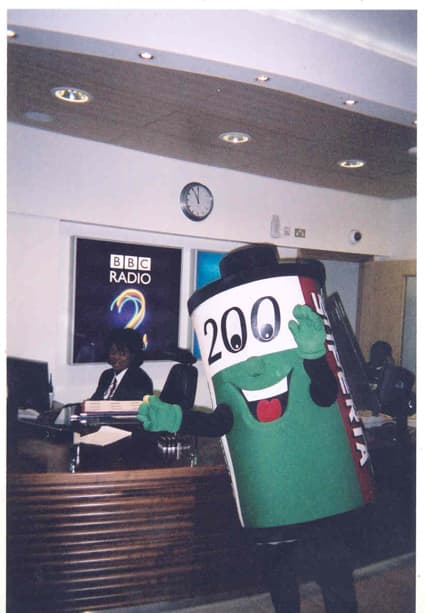The BBC has refuted Fujifilm UK?s claims that the Radio 2 presenter Jonathan Ross had suggested live on air that the company no longer makes film.
The denial comes after Fujifilm?s marketing team despatched a man dressed as a roll of Fujifilm to the BBC Radio studios in central London while Ross was live on air, in a bid ? they said – to ?prove him wrong?.
The giant film mascot ? dubbed ?Superia Sam? ? was sent to the Radio 2 offices in Great Portland Street armed with products including, crucially, a bag of films.
Fujifilm claims that during one of his Saturday morning shows the radio presenter said the company ?didn?t make film anymore?.
However, a spokeswoman for the BBC programme hit back telling us that ?the producer recalls that Jonathan did mention Fujifilm? – but she claimed that he actually said something along the lines of ?I wonder if they still do film??. The spokeswoman added: ?He didn?t make a statement saying “no they don?t?.?
The mascot (pictured) made it as far as the Radio 2 reception area where it posed for photo opportunities.
The following week, Jonathan Ross gave away the products brought in by the massive Fuji mascot, as prizes in a competition for listeners.
Darren Peake, marketing manager at Fujifilm Photofinishing said: ?Digital cameras are obviously hugely popular but at Fujifilm we still believe there is a place for film. When we heard that Jonathan Ross had said on air that we had stopped making film, we had to take action. It was a bit of a guerrilla opportunity, but it came off and got the message across to millions of listeners.?
In March Fujifilm slammed a report in The Times newspaper that wrongly stated it had announced its withdrawal from the traditional film and camera business.
At the time Will Rolls, Fujifilm’s marketing manager for Digital Imaging, told us: ‘We are not withdrawing from the film business. We are still committed to film production. It is still a vibrant market.’ However, he added: ‘There is no doubt that the declining demand for film is bringing about a need to restructure.’ The controversy came after the Japanese company announced the axing of 5,000 jobs worldwide ? many of which relate to film production ? though none were expected to affect the UK consumer.







